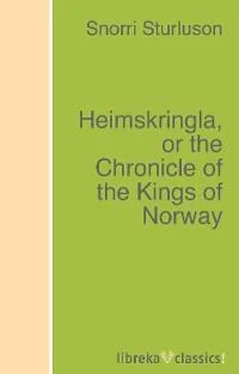Snorri Sturluson - Heimskringla, or the Chronicle of the Kings of Norway
Здесь есть возможность читать онлайн «Snorri Sturluson - Heimskringla, or the Chronicle of the Kings of Norway» — ознакомительный отрывок электронной книги совершенно бесплатно, а после прочтения отрывка купить полную версию. В некоторых случаях можно слушать аудио, скачать через торрент в формате fb2 и присутствует краткое содержание. Жанр: unrecognised, на английском языке. Описание произведения, (предисловие) а так же отзывы посетителей доступны на портале библиотеки ЛибКат.
- Название:Heimskringla, or the Chronicle of the Kings of Norway
- Автор:
- Жанр:
- Год:неизвестен
- ISBN:нет данных
- Рейтинг книги:3 / 5. Голосов: 1
-
Избранное:Добавить в избранное
- Отзывы:
-
Ваша оценка:
- 60
- 1
- 2
- 3
- 4
- 5
Heimskringla, or the Chronicle of the Kings of Norway: краткое содержание, описание и аннотация
Предлагаем к чтению аннотацию, описание, краткое содержание или предисловие (зависит от того, что написал сам автор книги «Heimskringla, or the Chronicle of the Kings of Norway»). Если вы не нашли необходимую информацию о книге — напишите в комментариях, мы постараемся отыскать её.
libreka classics – These are classics of literary history, reissued and made available to a wide audience.
Immerse yourself in well-known and popular titles!
Heimskringla, or the Chronicle of the Kings of Norway — читать онлайн ознакомительный отрывок
Ниже представлен текст книги, разбитый по страницам. Система сохранения места последней прочитанной страницы, позволяет с удобством читать онлайн бесплатно книгу «Heimskringla, or the Chronicle of the Kings of Norway», без необходимости каждый раз заново искать на чём Вы остановились. Поставьте закладку, и сможете в любой момент перейти на страницу, на которой закончили чтение.
Интервал:
Закладка:
26. OTTA AND HAKON IN BATTLE.
The Emperor Otta assembled a great army from Saxland, Frakland, Frisland, and Vindland. King Burizleif followed him with a large army, and in it was his son-in-law, Olaf Trygvason. The emperor had a great body of horsemen, and still greater of foot people, and a great army from Holstein. Harald, the Danish king, sent Earl Hakon with the army of Northmen that followed him southwards to Danavirke, to defend his kingdom on that side. So it is told in the "Vellekla":—
The Emperor Otta came with his army from the south to Danavirke, but Earl Hakon defended the rampart with his men. The Dane-work (Danavirke) was constructed in this way:—Two fjords run into the land, one on each side; and in the farthest bight of these fjords the Danes had made a great wall of stone, turf, and timber, and dug a deep and broad ditch in front of it, and had also built a castle over each gate of it. There was a hard battle there, of which the "Vellekla" speaks:—
Earl Hakon drew up his people in ranks upon all the gate-towers of the wall, but the greater part of them he kept marching along the wall to make a defence wheresoever an attack was threatened. Many of the emperor's people fell without making any impression on the fortification, so the emperor turned back without farther attempt at an assault on it. So it is said in the "Vellekla":—
After this battle Earl Hakon went back to his ships, and intended to sail home to Norway; but he did not get a favourable wind, and lay for some time outside at Limafjord.
27. HARALD AND HAKON ARE BAPTIZED.
The Emperor Otta turned back with his troops to Slesvik, collected his ships of war, and crossed the fjord of Sle into Jutland. As soon as the Danish king heard of this he marched his army against him, and there was a battle, in which the emperor at last got the victory. The Danish king fled to Limafjord and took refuge in the island Marsey. By the help of mediators who went between the king and the emperor, a truce and a meeting between them were agreed on. The Emperor Otta and the Danish king met upon Marsey. There Bishop Poppo instructed King Harald in the holy faith; he bore red hot irons in his hands, and exhibited his unscorched hands to the king. Thereafter King Harald allowed himself to be baptized, and also the whole Danish army. King Harald, while he was in Marsey, had sent a message to Hakon that he should come to his succour; and the earl had just reached the island when the king had received baptism. The king sends word to the earl to come to him, and when they met the king forced the earl to allow himself also to be baptized. So Earl Hakon and all the men who were with him were baptized; and the king gave them priests and other learned men with them, and ordered that the earl should make all the people in Norway be baptized. On that they separated; and the earl went out to sea, there to wait for a wind.
28. HAKON RENOUNCES CHRISTIANITY.
When a wind came with which he thought he could get clear out to sea, he put all the learned men on shore again, and set off to the ocean; but as the wind came round to the south-west, and at last to west, he sailed eastward, out through Eyrarsund, ravaging the land on both sides. He then sailed eastward along Skane, plundering the country wherever he came. When he got east to the skerries of East Gautland, he ran in and landed, and made a great blood-sacrifice. There came two ravens flying which croaked loudly; and now, thought the earl, the blood-offering has been accepted by Odin, and he thought good luck would be with him any day he liked to go to battle. Then he set fire to his ships, landed his men, and went over all the country with armed hand. Earl Ottar, who ruled over Gautland, came against him, and they held a great battle with each other; but Earl Hakon gained the day, and Earl Ottar and a great part of his men were killed. Earl Hakon now drove with fire and sword over both the Gautlands, until he came into Norway; and then he proceeded by land all the way north to Throndhjem. The "Vellekla" tells about this:—
29. THE EMPEROR OTTA RETURNS HOME.
The Emperor Otta went back to his kingdom in the Saxon land, and parted in friendship with the Danish king. It is said that the Emperor Otta stood godfather to Svein, King Harald's son, and gave him his name; so that he was baptized Otta Svein. King Harald held fast by his Christianity to his dying day.
King Burizleif went to Vindland, and his son-in-law King Olaf went with him. This battle is related also by Halfred Vandredaskald in his song on Olaf:—
30. OLAF'S JOURNEY FROM VINDLAND.
Olaf Trygvason was three years in Vindland (A.D. 982-984) when Geira his queen fell sick, and she died of her illness. Olaf felt his loss so great that he had no pleasure in Vindland after it. He provided himself, therefore, with warships, and went out again a plundering, and plundered first in Frisland, next in Saxland, and then all the way to Flaemingjaland (Flanders). So says Halfred Vandredaskald:—
31. KING OLAF'S FORAYS.
Thereafter Olaf Trygvason sailed to England, and ravaged wide around in the land. He sailed all the way north to Northumberland, where he plundered; and thence to Scotland, where he marauded far and wide. Then he went to the Hebrides, where he fought some battles; and then southwards to Man, where he also fought. He ravaged far around in Ireland, and thence steered to Bretland, which he laid waste with fire and sword, and all the district called Cumberland. He sailed westward from thence to Valland, and marauded there. When he left the west, intending to sail to England, he came to the islands called the Scilly Isles, lying westward from England in the ocean. Thus tells Halfred Vandraskald of these events:—
Olaf Trygvason had been four years on this cruise (A.D. 985-988), from the time he left Vindland till he came to the Scilly Islands.
32. KING OLAF IS BAPTIZED.
While Olaf Trygvason lay in the Scilly Isles he heard of a seer, or fortune-teller, on the islands, who could tell beforehand things not yet done, and what he foretold many believed was really fulfilled. Olaf became curious to try this man's gift of prophecy. He therefore sent one of his men, who was the handsomest and strongest, clothed him magnificently, and bade him say he was the king; for Olaf was known in all countries as handsomer, stronger, and braver than all others, although, after he had left Russia, he retained no more of his name than that he was called Ole, and was Russian. Now when the messenger came to the fortune-teller, and gave himself out for the king, he got the answer, "Thou art not the king, but I advise thee to be faithful to thy king." And more he would not say to that man. The man returned, and told Olaf, and his desire to meet the fortune-teller was increased; and now he had no doubt of his being really a fortune-teller. Olaf repaired himself to him, and, entering into conversation, asked him if he could foresee how it would go with him with regard to his kingdom, or of any other fortune he was to have. The hermit replies in a holy spirit of prophecy, "Thou wilt become a renowned king, and do celebrated deeds. Many men wilt thou bring to faith and baptism, and both to thy own and others' good; and that thou mayst have no doubt of the truth of this answer, listen to these tokens: When thou comest to thy ships many of thy people will conspire against thee, and then a battle will follow in which many of thy men will fall, and thou wilt be wounded almost to death, and carried upon a shield to thy ship; yet after seven days thou shalt be well of thy wounds, and immediately thou shalt let thyself be baptized." Soon after Olaf went down to his ships, where he met some mutineers and people who would destroy him and his men. A fight took place, and the result was what the hermit had predicted, that Olaf was wounded, and carried upon a shield to his ship, and that his wound was healed in seven days. Then Olaf perceived that the man had spoken truth, that he was a true fortune-teller, and had the gift of prophecy. Olaf went once more to the hermit, and asked particularly how he came to have such wisdom in foreseeing things to be. The hermit replied, that the Christian God himself let him know all that he desired; and he brought before Olaf many great proofs of the power of the Almighty. In consequence of this encouragement Olaf agreed to let himself be baptized, and he and all his followers were baptized forthwith. He remained here a long time, took the true faith, and got with him priests and other learned men.
Читать дальшеИнтервал:
Закладка:
Похожие книги на «Heimskringla, or the Chronicle of the Kings of Norway»
Представляем Вашему вниманию похожие книги на «Heimskringla, or the Chronicle of the Kings of Norway» списком для выбора. Мы отобрали схожую по названию и смыслу литературу в надежде предоставить читателям больше вариантов отыскать новые, интересные, ещё непрочитанные произведения.
Обсуждение, отзывы о книге «Heimskringla, or the Chronicle of the Kings of Norway» и просто собственные мнения читателей. Оставьте ваши комментарии, напишите, что Вы думаете о произведении, его смысле или главных героях. Укажите что конкретно понравилось, а что нет, и почему Вы так считаете.












